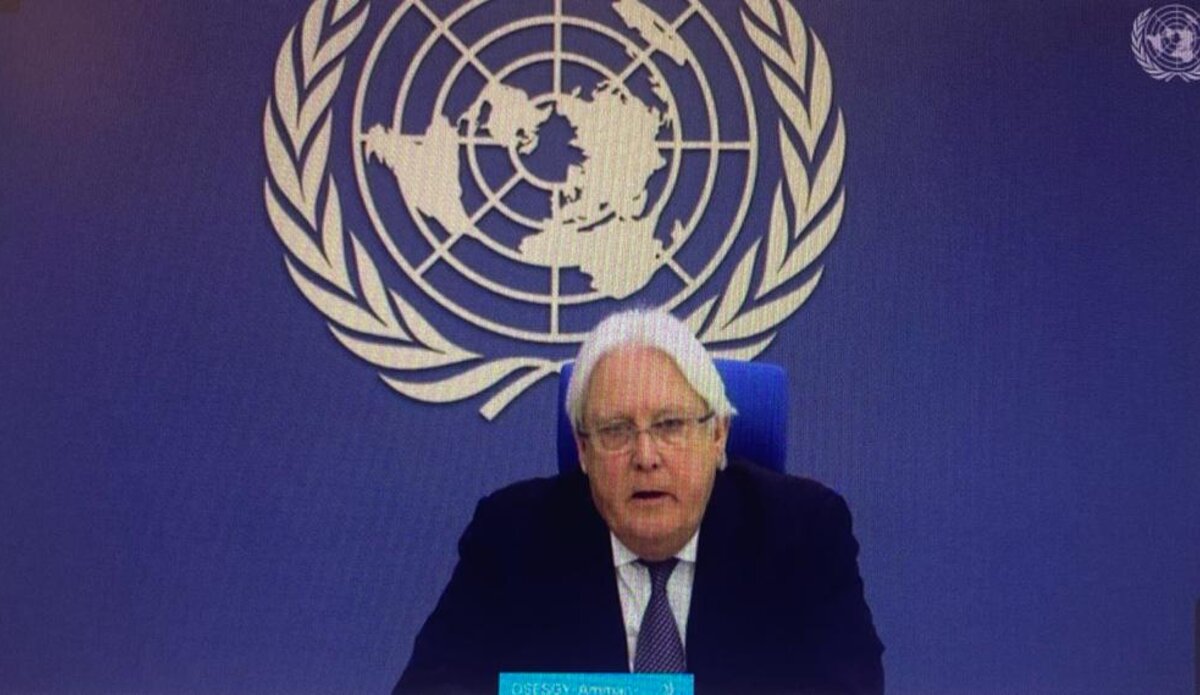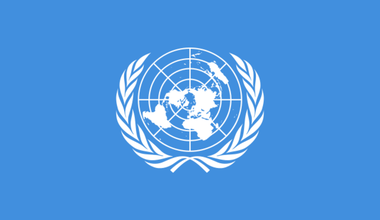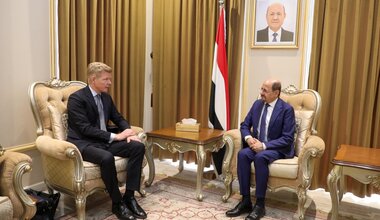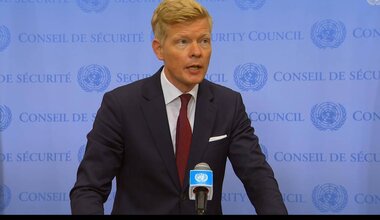BRIEFING TO UNITED NATIONS SECURITY COUNCIL BY THE SPECIAL ENVOY FOR YEMEN – MR. MARTIN GRIFFITHS
Mr. President, thank you very much indeed. Thank you for this opportunity and I would like to start by an unusual comment saying we have some good news in Yemen today. And as you probably know since this morning, the skies of Yemen have seen what I like to refer to as an airlift of hope.
The parties have started releasing prisoners and detainees, after the agreement they reached on the 27th of September in Switzerland. And this process will lead to the release of over a thousand individuals, all returning to their families. This will bring immense relief and comfort to all those families who waited so long to be reunited as well as to other families, close relations, friends and members of their communities. This is an extraordinary number to be released during the conduct of hostilities. And indeed, I understand that it is the largest such operation of its kind in the history of the conflict in Yemen.
As you might imagine, I am personally very grateful to the International Committee of the Red Cross and their President Peter Maurer for working with us to reach this agreement, and in addition for so diligently and expeditiously working on the implementation of the agreement itself a densely complicated task. I want to thank the Swiss government for hosting the meeting to which I have referred in a supportive environment, especially at a time when face-to-face meetings are so difficult to organize. I would also like to take this opportunity, unusually Mr. President, to congratulate my Deputy, Mr. Muin Shreim for his persistence and his mediation in reaching this agreement. I am very grateful to him and we all are in our mission.
More importantly perhaps, I commend the parties and we know that their respective leaderships stepped up to the plate and made the commitments necessarily to send their delegations to Switzerland for the talks and during the period of the negotiation to negotiate constructively, successfully, at length day and night to reach the agreement of these one thousand plus individuals.
Of course, Mr. President, this prisoners’ agreement does not include many thousands more of Yemenis detained during the course of this conflict. And it is therefore, our obligation and the obligation of the parties to convene very soon to discuss further releases, in line with the commitment that they made in Stockholm in December 2018 to release all conflict-related prisoners and detainees. Indeed, the first time I met President. Hadi, this was the first topic that he raised with me, the need for all prisoners to be released. I also would like to reiterate my call to the parties to unconditionally and immediately release all arbitrarily detained civilians, including journalists and political prisoners. I pay here, Mr. President, tribute to the Yemeni activists, actors, civil society organizations that have determinedly, and continuously and many times successfully in situations of peril, advocated for the release of civilians and for uncovering the fates of the forcibly disappeared.
We hope, of course, that the implementation of this agreement will build confidence and indeed momentum by demonstrating a simple truth: that peaceful dialogue, negotiations between the parties can deliver the road back to peace.
Mr. President, I’d also like to take note today, on the return of injured Yemenis to Sana’a yesterday who had gone to Oman for medical treatment around the time of the Stockholm talks in 2018. This is very good news for those who are finally returning home.
Mr. President,
My office continues to negotiate the agreement between the parties on a Joint Declaration. Both parties remain engaged in those negotiations, but they have yet to agree a final text. And I’d like to say that I am neither surprised nor indeed frankly discouraged by this. We are in fact asking a lot from the parties. I have just returned from a visit to Riyadh myself and had very useful and extensive meetings with the Government of Yemen of course and President Hadi as well as the leadership of the Arab Coalition. Now I am not surprised. I’m not discouraged. We are asking a lot. The Joint Declaration is an ambitious set of agreements, as President Hadi pointed out to me, which covers as you know, a nation-wide ceasefire, economic and humanitarian measures, and the resumption of the political process, perhaps the most important of the three. So, I do understand the reasons why the parties take their time to cross that crucial line. Negotiations have been conducted, after all, in the midst of a global pandemic we started in March, as you will remember Mr. President, as a result of the Secretary-General’s call for a global ceasefire and then his subsequent call for ceasefire in Yemen. Amidst to the global pandemic and lockdown and while the war raged perhaps even more voraciously across the battlefields of Yemen. The negotiations have been conducted solely through shuttle diplomacy. The meetings have been mostly virtual due to of course COVID-19 restrictions. And the parties have not yet met face-to-face to discuss the Joint Declaration. And we know now that virtual means may take us a long way, but they still do not replace the necessity of parties negotiating with each other to understand the commitments they will make to each other. This is what made the prisoner meeting of such importance and I hope such a precedent.
Mr. President, the primary goal of this Joint Declaration is to end, what I call, the shooting war and to open the gateway to peace. Resuming this process, as I have just said, is an imperative and frankly an obligation to the people of Yemen. In Riyadh yesterday, I met a group of Yemeni women, mostly from the south, who confirm again as we always hear every time, in meetings with civil society and women’s groups, that enough is enough. This war has gone on years more than it needs to.
So, I can’t stress enough, through you and through this Council, the need for the parties to act with urgency to conclude the negotiation on this Joint Declaration. What we have learned from the Yemen conflict and perhaps it is a general proposition is that, as time goes on in these internal conflicts, resolution becomes more difficult. Actors fragment and multiply. State institutions of course erode. The conflict becomes more entrenched and more the new norm. The war economy threatens the national economy, creating financial incentives for those who want to continue fighting. Interference from outside the country grows as opportunities present themselves, and in Yemen as elsewhere, the longer, the conflict goes on, it is not only the suffering of the people that continues, but also it makes it harder to reverse the circumstances that they live in.
Mr. President, on the military front, intensity of the fighting in Ma’rib - we have often discussed the campaign in Ma’rib - has decreased in the last days. This is important. But the situation remains volatile. And I reiterate my call for the attack on Ma’rib to cease completely of course and immediately.
Allow me Sir to also express my concern about the situation in Hudaydah. While my colleagues in the UN Mission for the Hudaydah Agreement continue their efforts to reactivate the Redeployment and Coordination Committee and those joint mechanisms contained in that resolution to implement the Hudaydah Agreement, the military situation in the city and the governorate has recently deteriorated significantly since my last briefing. And during the first week of October, clashes in the south of Hudaydah, particularly in the Al Durayhimi and Hays districts, developed into some of the most intense fighting since the signing of the Stockholm Agreement in December 2018, and we understand that this caused many civilian casualties, as well of course as those of combatants. The Mission and indeed I in their support, have engaged extensively with both sides issued public calls to stop the fighting. And following this, the situation now seems tense but calm. I hope the parties will sustain this calm and avoid putting the local population at further risk as well as threatening the validity and continuation of that Hudaydah Agreement.
Mr. President, I want to comment today on the situation in Taiz, a historic place in Yemen, as you know, that has experienced far too much suffering. It has been a battlefield these many years, and its people living there have lived in that warzone all this time. A solution is of course desperately needed for Yemen, but a solution is also needed to unlock the impasse between the various forces, and there are a number of them in Taiz. This solution, such a solution, should bring together all stakeholders, including particularly there but not only there, civil society and women’s groups famously active in Taiz, to contribute to reconciliation, to crossline efforts, to protecting schools, to allowing workers to go to work, and trade to take at least a small part of the life of those communities, and thus to alleviating the suffering. This is of great importance.
I want to turn, Mr. President, to two other issues that require urgent action to prevent even more widespread suffering in Yemen, and I know that we will hear from Mark about the fuel shortages in Ansar Allah-controlled areas are having evidently detrimental impacts on the civilian population. Prices are rising, vital services are being affected. The Government of Yemen has just in the last day or so, cleared a number of fuel ships to enter Hudaydah this week, and that is a positive step. But a mutually agreed solution is needed. And we have been working with the parties for months, frankly, to agree a set of arrangements which will ensure the uninterrupted flow of fuel into and around Ansar Allah-controlled areas to allow essentially the flow of humanitarian assistance by that reference to the people who need it. And of course, I urge the parties to please engage with me on the current proposals in front of them to make this happen.
Second, with respect to the Safer oil tanker, I acknowledge the positive public message from Sana’a on this matter in the recent days. Thank you. I won’t repeat what Mark and I have said on numerous occasions to this Council about the vital importance of the United Nations, through UNOPS, being granted permission to assess and undertake urgent initial repairs of the tanker. We all know what is at stake. The people in Yemen know what’s at stake, and it is more urgent by the day.
Mr. President, 20 years ago, this Council passed Resolution 1325, the landmark resolution on Women, Peace and Security recognizing women’s contributions to peace, as well as the disproportionate effects of armed conflict on women and girls. In Yemen, as in all sub situations, women have worked tirelessly, mostly behind the scenes, always below the radar to stop the war, reduce violence, release detainees and build back peace. They do this against all odds with a courage we can only imagine and often under circumstances which threaten their lives, their livelihoods and their families.
So, I remind on this occasion, on this anniversary, all parties to the conflict in Yemen to take special measures of course to protect women and girls and human rights defenders from all kinds of violence and threats. I hope they as we, will heed the calls of Yemeni women, the consistent calls of Yemeni women, and I said just heard again just yesterday in Riyadh for a just and equitable peace, not just a peace, but for a just and equitable peace. And I call on them to strengthen the meaningful participation of women, including by ensuring at least 30% in their negotiating delegations. I remind all of us of the extraordinary record in the national dialogue in Yemen of such participation when Yemen was an icon of female participation in national dialogues.
Finally, Mr. President, I want to refer perhaps a little bit eccentrically to the issue of education. And I refer to it not perhaps as purely as humanitarian but as an illustration of the costs of war, and I was minded to say this to you, Sir and the Council, through reading about one particular school in Taiz, where the children risk their lives to go to school and yet go there. Where they go to school where there are few, if any materials, where the teachers I’m sure have rarely been paid and yet go there. And this struggle, this struggle to continue an education for the next generation is remarkable, and we see it in every conflict, and we see it in Yemen. And it is a testament to the courage of Yemeni families and the plight of Yemeni children.
Thank you, Mr. President.
 UN
UN







